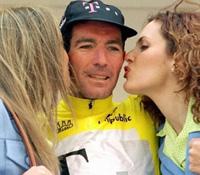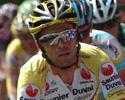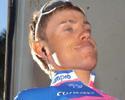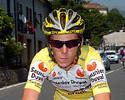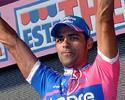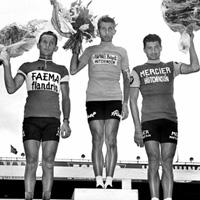Latest Cycling News for May 22, 2007Edited by Gregor Brown Former Telekom rider confirms team doping in 1990sBy Susan Westemeyer
Bert Dietz, who rode for Team Telekom from 1994 to 1998, has confirmed that team doctors provided EPO (Erythropoietin) and other illegal doping products to its riders. In an appearance Monday night on German television, he upheld the charges made by former soigneur Jef d'Hondt concerning the team doctors Andreas Schmid and Lothar Heinrich. "When the doctors were there, they gave us the shots themselves," Dietz said on television program Beckmann. "When they weren't there, then the soigneurs did it, that is, Jef d'Hondt." T-Mobile responded promptly to the allegations, referring to its new anti-doping program. "This is a rerun of concrete allegations," Christian Frommert, head of Sponsoring Communication for sponsor Deutsche Telekom, told Cyclingnews. "It becomes more and more clear that our [new anti-doping] course is very important and the only way to go. This is our way for the future, but we are looking at the past as well, together with Rolf Aldag and the current management." Aldag, who was named Sport Director of the team last fall, rode for Team Telekom/T-Mobile from 1993 to 2005. He has claimed to know nothing about doping within the team and said that he never used the products. Dietz rode for Telekom from 1994 to 1998 and for Team Nürnberger from 1999 to 2000. He was not on Telekom's winning Tour de France teams in 1996 or 1997 but he did win a stage of the Vuelta a España 1995. He refused to say which other riders were involved. When asked specifically about Tour winners Bjarne Riis and Jan Ullrich, he responded "I am here to tell my story," saying that he didn't want to put the finger on anyone else. Dietz is now only indirectly involved with cycling, as he runs a sporting goods store. He does not expect any direct consequences for his confession, as might someone who is still active either as a rider or in management. "Other riders must be afraid of losing their job and never again being hired by a team," he noted. If he wasn't willing to implicate his former teammates, he was ready enough to speak out against Schmid and Heinrich. At first it was cortisone. But in 1995, he said, the doctors told the riders about EPO. "It was a training camp on Mallorca in the spring. The doctors were becoming more and more involved in our training plans, at the wish of Telekom. In individual discussions, which they held with everyone, they first described the general situation in cycling. Then they came to the specific situation of Team Telekom; that we have pressure on us in the spring. And when we wanted to ride in the front, then we would probably have to try this new product. It was roughly explained how it worked and what side-effects and risks it had. That was, in principle, the decision, that we would do it." At the time, there were no doping tests to detect EPO usage. "Later we had to be more careful." He eventually had his own centrifuge to conduct his own controls, so that he his blood values didn't go too high. Asked if the doctors simply offered the EPO or whether they ordered the riders to take it, Dietz responded, "They offered it, but of course in such a way that everyone knew 'If I don't take this now, then probably I will have such bad results at the end of the year, that my contract won't be extended.' So, yes, it was pretty obvious." Most of the riders had only one or two year contracts, and to receive extensions, the riders were expected to show good results in the spring. "The Henninger Turm race [held on May 1] was usually the limit." In other words, the riders doped because they were afraid that otherwise they would lose their jobs. "You want to pursue your career. You realize, 'I can't do with normal means.'" The riders had to trust the doctors blindly, Dietz noted. "We often didn't know what they were giving us." Telekom suspended its relationship with Schmid and Heinrich earlier this month after d'Hondt's book appeared, in which he named them as providing doping to the team. The Freiburg University Clinic, with which they are associated, is also conducting its own investigation into the charges. Both doctors have proclaimed their innocence. Giro's heavy-hitters contemplate the SantuarioSimoni, Cunego and Di Luca considers tough day ahead
Today the riders of the 90th Giro d'Italia will face the second of four mountain-top finishes in the form of Santuario Nostra Signora della Guardia. The 8.8-kilometre Santuario climb comes at the end of a taxing 250-kilometre northern run from Camaiore and, with its maximum gradient of 14% (and average of 8%), it should suit the explosive climbers, like Cunego, Di Luca and Riccò. However, the wise rider will have taken note of the 16.33-kilometre long Passo del Biscia, topping out 97.4 kilometres before Bolzaneto, the base of the final test, and the smaller Campi, 18.4 kilometres to Bolzaneto. "It will certainly be more demanding than the arrival of Montevergine, and more adapted to my style," said the two-time Giro winner Gilberto Simoni to La Gazzetta dello Sport. "There are more kilometres; the climb is longer and harder. Then, the more you climb the more the gradient increases. "It won't be a decisive stage. I think that Sunday we let go an escape that will live on." He predicted what could happen in stage 10, "Probably an escape will go but before half-way up the climb it will be 'gruppo compatto.' Then there will be an attack from Sella or [Pérez] Cuapio and at this point who has the legs will play their cards. I suspect that some who departed from Sardegna as a captain will be reduced to a 'gregario.'"
2004 winner and Simoni's old teammate, Damiano Cunego (Lampre-Fondital), has marked this climb in his race book "in red." He noted that this coming week could be worse than the third week. "We are starting a week that is may be harder than the last," he said. "You will need to stay covered until the last minute and understand if you should limit yourself or take the race in hand. "I have the condition to win it but I also see Savoldelli going well." Danilo Di Luca (Liquigas) is a similar type of 'explosive climber' as Cunego and he could seek to double on his Montevergine success. "Gibo," said the ex-Maglia Rosa when asked to name a favourite. "He is rising in these day and could vie for victory. I want to be there with him in what I consider the first of the important finishes in this Giro." Riccò and Bettini clarify Passo della Futa incident
Riccardo Riccò and World Champion Paolo Bettini met yesterday before the start of stage nine to discuss what exactly happened in stage eight, where the young Saunier Duval rider was briefly in the power-escape that stayed clear to the finish. That Sunday Riccò left the escape to the dismay of his team and, thus, put the yellow boys on the offensive to pull back the move that could have far-reaching GC consequences. "I should have stayed up front and pulled. It was an error of inexperience," the 23 year-old clarified on the team bus to La Gazzetta dello Sport. "Has it passed? No, it has not yet passed and tomorrow I will vent my anger on the climb," continued Riccò, referring to today's stage that finishes with the 8.8-kilometre climb to Santuario Nostra Signora della Guardia. "It was a very interesting escape but with Riccò it would not work," said the World Champ who met with Riccò in the Saunier team bus. "Maybe he made a mistake of inexperience." "We were going all out and there was not time to talk," continued Riccò. "Like I said yesterday, no one said anything to me but it was the actions. I am young and maybe I made some mistakes," Riccò added, sitting next to Bettini. It was a light atmosphere on the team bus. "May I have a caffè corretto, with Grappa!?" Bettini joked. Gilberto Simoni gave Bettini a pastry with chocolate and the caffè, un-corrected, came from Leonardo Piepoli. Napolitano reignsPizzeria in the works and Cipollini weighs-in.
A stage win in the Giro d'Italia is one thing but a Pizza Margarita is another. Danilo Napolitano, winner of stage nine of the Giro d'Italia, thinks that his adopted hometown of Iseo could use a Pizzeria, according to La Gazzetta dello Sport. His parents live in the south, in Vittoria, Sicily, but Danilo and his brother, Massimiliano, live in Italy's northern region of Lombardy. The 26 year-old followed his brother, who is now a soigneur with Lampre-Fondital, to Lago d'Iseo (near Brescia) where he lives in a new two-story home near Gelateria Amalfi. The gelateria's manager Mario Esposito is from Naples and he has given the Lampre sprinter the idea of opening up a pizzeria near Iseo. When he was young, Napolitano worked hard as a mason with his father while training as a track rider and, thus, knows the value of hard work. "Who will win today? Alessandro Petacchi should do well, he knows the roads. I also like Napolitano for today," said retired sprint king Mario Cipollini during yesterday's stage. Petacchi was racing on home roads and he gave consideration to the sea breeze while Napolitano shows sprint strength. "There was a headwind that impeded Petacchi, who had to remount. But there was also a side-wind that gives merit to Napolitano, who did the sprint on the left side, in other words, the side in which the wind arrives off the sea," noted the 42-time Giro stage winner. Napolitano also had to ride a longer sprint due to Robbie McEwen's drift to the left. "This did not stop Danilo from winning with valour, making the most of his qualities as a sprinter. Nikolai Trusov comments on Camaiore sprintOleg Tinkov watched down from his villa as the sprint blew by in yesterday's Giro stage 9 to Lido di Camaiore. The Russian business man must have been impressed with his 21 year-old charge, Russian Nikolai Trusov. "I got excellent help from teammates who led me out to the front, and I was even catching Petacchi's wheel when we touched the bikes with someone, I think from Rabobank," said the rider to Tinkoff's Press Officer Sergey Kurdyukov. "In a speedy sprint like that 800 metres is short, too short to regain what you've lost. I'm not complaining about this episode, I have no illusions; war is war, that's what sprinter's work look like. "Everybody only sees the finish line, not each other. People told me I almost clashed with Paolo Bettini, but honestly I didn't even have an idea that he was beside. Those who watched the helicopter view also remarked of the episode when an Italian from Acqua e Sapone rode up to me and tried to elbow... they said it was Garzelli, maybe it was him ... "The Italians are very emotional and aggressive in the sprint, half an hour after the finish they cool down, and everything is back to normal." Trusov went on to finish 15th but gain valuable experience bumping up against the best in the game. "About the final result – well, perhaps I would be much better-off if I pushed my way through with my arms and elbows like Danilo Napolitano does, but that's definitely not my way, and the peloton doesn't like riders with such style too much. I don't feel like earning a similar reputation from the very start of my career." Former rider Jef Planckaert passes at age 73
Jef Planckaert, who finished second in the Tour de France in 1962, has died at the age of 73 following a lingering illness, Sporza reported. Planckaert, who is not related others in cycling with the same name, rode professionally from 1954 to 1965. His best year was 1962, when he finished second in the Tour behind Jacques Anquetil, won the Belgian national championship, and won both Paris-Nice and Liège-Bastogne-Liège. He finished in the top twenty of the Tour six times, His other major wins included Omloop Het Volk, Kuurne-Brussel-Kuurne (twice), and the 4 Jours de Dunkerque , which he won in 1957, 1960 and 1963. Joseph "Jef" Planckaert:Teams Major wins: Other important finishes: Rasmussen aims for Olympic Mountain bike raceMichael Rasmussen of Team Rabobank hopes to enter the 2008 Olympic mountain bike races in Peking, he said this week, according to the ANP press agency. "I will make my comeback in August" in the Danish national championships, he said. "Rabobank thinks it is a good idea and Colnago has already made a mountain bike for me," he noted of the team and equipment agreement. "I will not ride the championship just for fun. I will be there to win it. And, afterwards, I hope that the Danish association will give me a place on the team for Peking." Rasmussen was mountain bike world champion in 1999, and has been a road rider since 2002. Hondo won't appeal suspension any furtherDanilo Hondo has said that he won't appeal the extension of his doping-related suspension through January 2008, noting that "the legal uncertainty is too great." But he definitely plans a comeback at that time. "I think that I can still ride another three or four years," he told the Lausitzer Rundschau. Until then, "I will have to sit out the rest of my ban, it's only about a half a year." Hondo, who rode for Team Gerolsteiner at the time, tested positive for the drug Carphedon in March 2005. McEwen father and son support helmet useRobbie McEwen may be known for his all-out sprinting, but he knows that safety is important. And as a father, he also knows that the safety of children on their bikes is very important. That is why he and his son Ewan are heading up a campaign with the Belgian "Q8" chain of gas stations to provide 10,000 cycling helmets for children from five to 12 years-old. The helmets, which normally cost €35, will be sold at Q8 stations in Belgium and Luxembourg for only €9.90, from May through September of this year. All helmets will bear McEwen's signature. IPCT announces sticker album dealBen Atkins The International Professional Cycling Teams (IPCT) announced yesterday that they have agreed an exclusive four-year deal with Celio Sport and Image to produce sticker albums and team annuals for its 17 member teams. The deal is seen by the IPCT as one of the first important deals agreed for the growth of their principle objective – to "represent not only the individual economic interests of the teams but as a united group." There are currently no details as to when the first of these products is to hit the shelves, or in which countries they will be available. Previous News Next News (All rights reserved/Copyright Knapp Communications Pty Limited 2007) |

|
January 2009 |
Recently on Cyclingnews.com |

